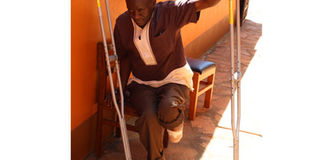What started as an itchy toe cost former Busoga College Mwiri teacher his leg

Mr George Kapere, a 54-year-old former teacher of Busoga College Mwiri in Jinja District. PHOTO DENIS EDEMA
What you need to know:
- The Assistant Medical Superintendent Farnfield Medical Centre in Buikwe district, Mr Warren Wabulembo, said high blood glucose levels cause nerves to die which affects blood vessels, leading to reduction in oxygen supply to the affected area.
A former teacher of Busoga College Mwiri in Jinja District, whose leg was amputated due to diabetes, is seeking for financial assistance.
Mr George Kapere, a 54-year-old resident of Kaliro Road in Iganga Municipality, on Tuesday said he has suffered with the illness for over 20 years until November 7, 2017 when his left leg was amputated at Kumi Orthopedic Centre in Kumi district.
Now retired, Mr Kapere, says he taught many prominent people in Uganda and is seeking assistance from friends and former students “who include the Prime Minister, Dr Ruhakana Rugunda and the Kyabazinga of Busoga, William Gabula Nadiope IV among others.”
After retiring from Mwiri where he taught mathematics at O’level between 1993 and 2007, Mr Kapere resorted to teaching in private schools, notably Jinja Progressive Academy in Jinja district.
“I will not be able to teach when schools start because I am still nursing the leg and don’t know how long it will take to heal yet I have to support my family,” he said.
According to Mr Kapere, he developed an itchy sore on his big toe, and when he tried to remove it, it came off with some flesh. Later, the leg started swelling but he took it as something minor until it turned painful.
“It was after I visited Mercy Clinic in Iganga district that tests revealed that I was suffering from diabetes and High Blood Pressure.
“The results also indicated that the wound at the big toe was infected and started spreading towards the ankle and doctors recommended an amputation to save my life,” he said.
Accordingly, confirmatory tests were carried out at Nile International Hospital in Jinja district which were positive for diabetes and High Blood Pressure.
The Assistant Medical Superintendent Farnfield Medical Centre in Buikwe district, Mr Warren Wabulembo, said high blood glucose levels cause nerves to die which affects blood vessels, leading to reduction in oxygen supply to the affected area.
He added that due to the above condition, any injury, however small, takes long to heal and usually develops into gangrene infection.
“This infection is usually managed by removal of the skin and tissue around the infected area or amputation to stop microorganisms from spreading to other parts of the area,” he explained.
He also advised patients with diabetes to have their blood sugar levels monitored routinely and take their medication as prescribed by the medical worker. “Such patients should also avoid foods with a lot of glucose,” he advised.




